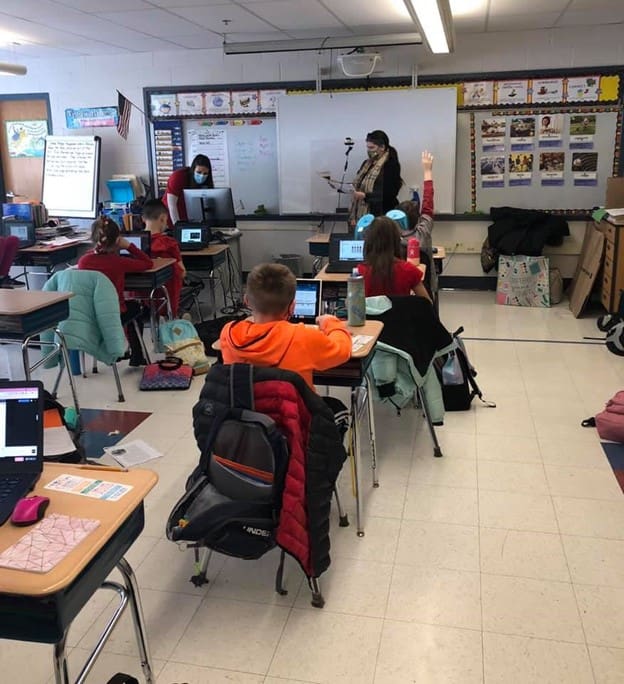 “Our coalition was just awarded a Year 6 – 10 DFC grant,” said Haley Brown, Project Director of the Wolcott Citizens Against Substance Abuse (CASA) coalition. “Our city’s school board is the fiscal agent for the grant and our office is actually located in the high school. Being in a school system allows us to closely work with students and school staff on a lot of impactful initiatives. Almost two years ago, we decided to increase our connection with elementary school youth after having conversations with high school students who would say ‘this is great, but talk to us when we’re younger; we’re more impressionable then and this will stick with us.’ This is why we started the ‘Catch My Breath’ program, which is a vaping prevention curriculum for students in grades 5 – 12. This program was developed by health education experts from The University of Texas School of Public Health (UTHealth) in Austin and was designed to help student make healthy choices and avoid risky behaviors when it comes to e-cigarettes. In 2018, about 30% of Wolcott High School Students reported having used an e-cigarette in the last 30 days.”
“Our coalition was just awarded a Year 6 – 10 DFC grant,” said Haley Brown, Project Director of the Wolcott Citizens Against Substance Abuse (CASA) coalition. “Our city’s school board is the fiscal agent for the grant and our office is actually located in the high school. Being in a school system allows us to closely work with students and school staff on a lot of impactful initiatives. Almost two years ago, we decided to increase our connection with elementary school youth after having conversations with high school students who would say ‘this is great, but talk to us when we’re younger; we’re more impressionable then and this will stick with us.’ This is why we started the ‘Catch My Breath’ program, which is a vaping prevention curriculum for students in grades 5 – 12. This program was developed by health education experts from The University of Texas School of Public Health (UTHealth) in Austin and was designed to help student make healthy choices and avoid risky behaviors when it comes to e-cigarettes. In 2018, about 30% of Wolcott High School Students reported having used an e-cigarette in the last 30 days.”
“After meeting with our school Superintendent, it was decided that we would actually start with 4th graders in our 3 elementary schools. We developed a comprehensive toolkit that was adapted thru two lessons. We were able to do a pre and post-test to gauge their knowledge before and after the two sessions. The results of the post-test were very encouraging. During the pre-test 55% of students stated that most vapes and e-cigarettes possessed some amount of nicotine while 39% didn’t know. After going thru the curriculum 86% of the youth said that they now knew these products possessed nicotine. In addition, the pre-test showed that 28% of youth thought that Juul pods contained as much nicotine as a pack of cigarettes, and 57% didn’t know. Post-test data showed that following the training 75% said that was true. In fact, a large majority of students who participated in the program indicate increased knowledge of vaping, lowered interest in starting to vape, ability to use refusal skills, and marketing tactics utilized around vaping. 96% of students feel that program should be offered to all 4th graders and 72% did discuss learned information with family or friends.”
“To raise their awareness, we spoke to them about how harmful nicotine is to the adolescent brain and the harmful chemicals that are in e-cigarettes, just like they are in traditional cigarettes. We ended the sessions with some role-playing of how to say no to vaping. Due to the success of this pilot, the school actually adapted this as part of their full curriculum and thus this will be taught to elementary school students for years to come. We’re really proud that we were able to get this program in this year, especially with the challenges that the COVID-19 pandemic brought to not just our community, but the nation and world as a whole. A great by-product of this training was that it benefited the teachers as well. For instance, through these conversations, we learned that many of them did not know that the state of Connecticut recently approved Tobacco 21 legislation.”
“At first, when we talked to teachers and parents about speaking to 4th graders about tobacco there was a little hesitation but since youth have so much more access to misinformation about tobacco and vaping on the internet these days, it was good to have a trusted adult source talk to them about what it really means to use tobacco and vaping products. The biggest challenge we had in this project was getting stakeholder engagement and buy-in. Being part of a school system means that it comes with dealing with certain approval processes that are already in place. Initially school administrators thought that there was going to be more pushback than there actually was. We developed parent consent forms and a formal letter to parents explaining the goal of this project and luckily we did not have any parents who chose to have their kids omitted from this program.”
“My advice to other coalitions looking to implement an education curriculum like this to elementary school students is to stay persistent with your goal. There are a few areas of the training that we can probably expand on next year and maybe tailor a little more, but it is encouraging to see the positive impact and outcomes that happened from just this initial pilot.”


